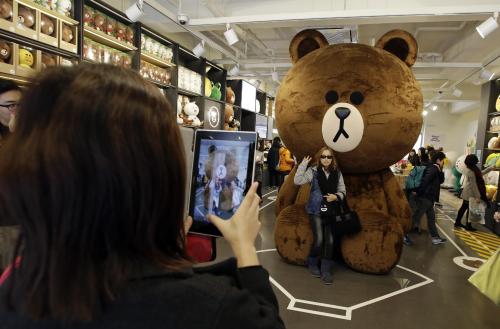Translate
Thursday, March 26, 2015
Wednesday, March 25, 2015
Myanmar Slaves in Indonesia (AP report)
BENJINA, Indonesia (AP) — The Burmese slaves sat on the floor and stared through the rusty bars of their locked cage, hidden on a tiny tropical island thousands of miles from home.
Just a few yards away, other workers loaded cargo ships with slave-caught seafood that clouds the supply networks of major supermarkets, restaurants and even pet stores in the United States.
Here, in the Indonesian island village of Benjina and the surrounding waters, hundreds of trapped men represent one of the most desperate links criss-crossing between companies and countries in the seafood industry. This intricate web of connections separates the fish we eat from the men who catch it, and obscures a brutal truth: Your seafood may come from slaves.
---
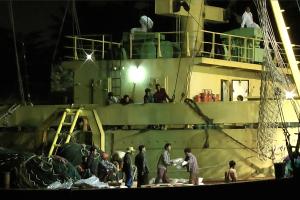
EDITOR'S NOTE: The Associated Press notified the International Organization for Migration about men in this story, who were then moved out of Benjina by police for their safety. Hundreds of slaves remain on the island, and five other men were in the cage this week.
---
The men The Associated Press spoke to on Benjina were mostly from Myanmar, also known as Burma, one of the poorest countries in the world. They were brought to Indonesia through Thailand and forced to fish. Their catch was shipped back to Thailand, and then entered the global commerce stream.
Tainted fish can wind up in the supply chains of some of America's major grocery stores, such as Kroger, Albertsons and Safeway; the nation's largest retailer, Wal-Mart; and the biggest food distributor, Sysco. It can find its way into the supply chains of some of the most popular brands of canned pet food, including Fancy Feast, Meow Mix and Iams. It can turn up as calamari at fine dining restaurants, as imitation crab in a California sushi roll or as packages of frozen snapper relabeled with store brands that land on our dinner tables.
In a year-long investigation, the AP interviewed more than 40 current and former slaves in Benjina. The AP documented the journey of a single large shipment of slave-caught seafood from the Indonesian village, including squid, snapper, grouper and shrimp, and tracked it by satellite to a gritty Thai harbor. Upon its arrival, AP journalists followed trucks that loaded and drove the seafood over four nights to dozens of factories, cold storage plants and the country's biggest fish market.
Some fishermen, risking their lives, begged the reporters for help.
"I want to go home. We all do," one Burmese slave called out over the side of his boat, a cry repeated by many men. "Our parents haven't heard from us for a long time, I'm sure they think we are dead."
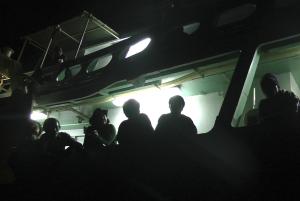
Their catch mixes in with other fish at numerous sites in Thailand, including processing plants. U.S. Customs records show that several of those Thai factories ship to America. They also ship to Europe and Asia, but the AP traced shipments to the U.S., where trade records are public.
The major corporations identified by AP declined interviews but issued statements that strongly condemned labor abuses; many described their work with human rights groups to hold subcontractors accountable.
National Fisheries Institute spokesman Gavin Gibbons, speaking on behalf of 300 U.S. seafood firms that make up 75 percent of the industry, said his members are troubled by the findings.
"It's not only disturbing, it's disheartening because our companies have zero tolerance for labor abuses," he said. "These type of things flourish in the shadows."
The slaves interviewed by the AP described 20- to 22-hour shifts and unclean drinking water. Almost all said they were kicked, beaten or whipped with toxic stingray tails if they complained or tried to rest. They were paid little or nothing.
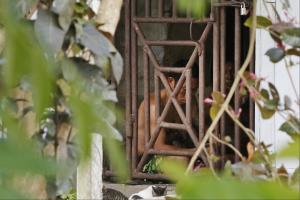
Runaway Hlaing Min said many died at sea.
"If Americans and Europeans are eating this fish, they should remember us. There must be a mountain of bones under the sea," he said. "The bones of the people could be an island, it's that many."
The small harbor in the village is occupied by Pusaka Benjina Resources, whose five-story office compound includes the cage with the slaves. The company is the only fishing operation on Benjina officially registered in Indonesia, and is listed as the owner of more than 90 trawlers. However, the captains are Thai, and the Indonesian government is reviewing to see if the boats are really Thai-owned. Pusaka Benjina did not respond to phone calls and a letter, and did not speak to a reporter who waited for two hours in the company's Jakarta office.
At the Benjina port, the AP interviewed slaves from a dozen fishing vessels offloading their catch into a large refrigerated cargo ship, the Silver Sea Line.
The ship belonged to the Silver Sea Reefer Co., which is registered in Thailand and has at least nine refrigerated cargo boats. The company said it is not involved with the fishermen.
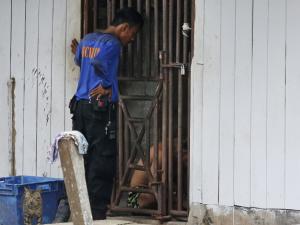
"We only carry the shipment and we are hired in general by clients," said company owner Panya Luangsomboon. "We're separated from the fishing boats."
The AP followed that ship, using satellite tracking over 15 days to Samut Sakhon, Thailand, and journalists watched as workers packed the seafood over four nights onto more than 150 trucks, following deliveries to factories around the city.
Inside those plants, representatives told AP journalists that they sold seafood to other Thai processors and distributors. U.S. Customs bills of lading identify specific shipments from those plants to American firms, including well-known brand names.
For example, one truck bore the name and bird logo of Kingfisher Holdings Ltd., which supplies frozen and canned seafood around the world. Another truck went to Mahachai Marine Foods Co., a cold storage business that also supplies Kingfisher, according to Kawin Ngernanek, whose family runs it.
"Yes, yes, yes, yes," said Kawin, who also serves as spokesman for the Thai Overseas Fisheries Association. "Kingfisher buys several types of products."

When later asked about abusive labor practices, Kawin was not available. Instead, Mahachai Marine Foods manager Narongdet Prasertsri responded: "I have no idea about it at all." Kingfisher did not answer repeated requests for comment.
Every month, Kingfisher and its subsidiary KF Foods Ltd. sends about 100 metric tons of seafood from Thailand to America, according to U.S. Customs records. These shipments have gone to Stavis Seafoods, a Boston-based Sysco supplier, and other distributors.
"The truth is, these are the kind of things that keep you up at night," said CEO Richard Stavis, who grandfather started the company. He said his business visits international processors, requires notarized certification of legal practices and uses third-party audits.
"There are companies like ours that care and are working as hard as they can," he said.
A similar pattern repeats itself with other companies and shipments.

The AP followed another truck to Niwat Co., where part owner Prasert Luangsomboon said the company sells to Thai Union Manufacturing. Weeks later, when confronted about forced labor in their supply chain, Niwat referred several requests for comment to Luangsomboon, who could not be reached for further comment.
Thai Union Manufacturing Co. is a subsidiary of Thai Union Frozen Products PCL., Thailand's largest seafood corporation, with $3.5 billion in annual sales. This parent company, known simply as Thai Union, owns Chicken of the Sea and is buying Bumble Bee, although the AP did not observe any tuna fisheries.
Thai Union says its direct clients include Wal-Mart, and ships thousands of cans of cat food to the U.S. every month, including household brands like Fancy Feast, Meow Mix and Iams. These end up on shelves of major grocery chains, such as Kroger, Safeway and Albertsons, as well as pet stores. Again, however, it's impossible to tell if a particular can of cat food might have slave-caught seafood.
Thai Union said it takes multiple stakeholders to eradicate labor abuses.
"We all have to admit that it is difficult to ensure the Thai seafood industry's supply chain is 100 percent clean," Thai Union CEO Thiraphong Chansiri said in an emailed statement.
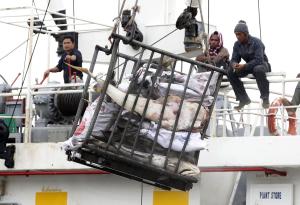
The enslaved fishermen on Benjina had no idea where the fish went, only that it was too valuable for them to eat. Their desperation was palpable.
A crude cemetery holds more than 60 graves strangled by tall grasses and jungle vines. The small wooden markers are neatly labeled, some with the falsified names of slaves and boats. Only their friends remember where they were laid to rest.
In the past, former slave Hla Phyo said, supervisors on ships simply tossed bodies into the sea to be devoured by sharks. But after authorities and companies started demanding that every man be accounted for on the roster upon return, captains began stowing corpses alongside the fish in ship freezers until they arrived back in Benjina.
"I'm starting to feel like I will be in Indonesia forever," said Phyo, wiping a tear away. "I remember thinking when I was digging, the only thing that awaits us here is death."
----
Esther Htusan contributed to this report from Benjina, Indonesia. Mason reported from Samut Sakhon, Thailand; Mendoza reported from Boston, Mass.
To follow Martha Mendoza and Margie Mason on Twitter: https://twitter.com/mendozamartha , https://twitter.com/MargieMasonAP
Buying human breast milk online poses serious health risk, say experts
http://www.theguardian.com/lifeandstyle/2015/mar/24/buying-human-breast-milk-online-health-risk
A growing market in online sales of often contaminated human breast milk – fuelled in part by bodybuilders and adults with a baby fetish – poses a serious risk to public health, according to experts.
Researchers from the University of London's school of medicine and dentistry were so alarmed by their initial findings that they wrote an editorial in the British Medical Journal to warn of the dangers of buying breast milk online before their study was completed. The editorial says breast milk sold online should be screened for diseases such as hepatitis, HIV and syphilis.
Lead author Dr Sarah Steele said she feared that babies would die from unscreened milk sold online if the market was not regulated. In one of the studies she cited, more than 90% of breast milk purchased online was found to have bacterial growth. Some of the sellers interviewed included intravenous drug users.
Unregulated websites selling breast milk attract tens of thousand of users in the US, the research found. One site reported growing by 800 users each month. It also reported an emerging market in the UK on specialist sites as well as general retail sites including Gumtree and Craigslist. Premium prices of up $4 (£2.70) per fluid ounce (30ml) are offered by mothers who purport to eat only organic or vegan food, or can boast having "fat, chubby babies", the researchers found.
The online market caters primarily for mothers who are unable to breastfeed their babies, serving as a cheaper alternative to regulated milk banks, where the milk is always pasteurised. But consumers also include cancer patients who believe breast milk has health benefits and gym enthusiasts who believe breast milk is a natural superfood. A third group of adult consumers are fetishists "who like to be fed like a baby, either from source or from a bottle", according to Steele.
She told the Guardian: "I reserve my judgment on these things. The focus for us is that people need to be making safer feeding choices. In the adult market there are cancer patients who are desperate to try anything and a lot of people in the body-building and cross-fit communities who really don't realise the dangers. They think it's a natural superfood. They don't realise that it could be contaminated with bacteria."
Steele explained the dangers: "When sellers freeze milk and send it in the mail it thaws out. That's when bacteria has time to grow and and become really dangerous, especially for infants."
She added: "We started this study from a curiosity point of view initially, but the public health data is so definitive on how dangerous it is that we couldn't wait for the end of our project because that could have taken several years to complete. It was so damning that we felt we had to approach the BMJ and say: 'This needs to get out there now.' We don't want to be writing the report after there has been an infant death in Britain."
The editorial calls for healthcare workers to be trained to offer advice about how to acquire breast milk safely. Steele said: "We observed that mothers are often in a desperate state and are nervous about talking to healthcare professional about their difficulties feeding. The big danger is that more women turn online and that threatens the health of their infants. And with the adult market growing, we want to make sure people aren't spreading communicable diseases in new ways, just as we are getting on top of things like hepatitis, syphilis and HIV."
Steele said the health benefits for adults of drinking breast milk were unproven. "Human breast milk doesn't really have that many advantages for adults," she said. "It is certainly not what you need in the context of bodybuilding and cross-fit, as a post-workout recovery drink."
She pointed out that consuming breast milk was regularly discussed on mainstream online bodybuilding forums.
The paper concludes: "Although breast milk holds many known benefits, seeking out another's milk rather than turning to instant formula poses risks. When breast milk is screened and treated appropriately, as the World Health Organisation states, it remains second to a mother's own milk as best for infant feeding. At present, milk bought online is a far from ideal alternative, exposing infants and other consumers to microbiological and chemical agents. Urgent action is required to make this market safer."

